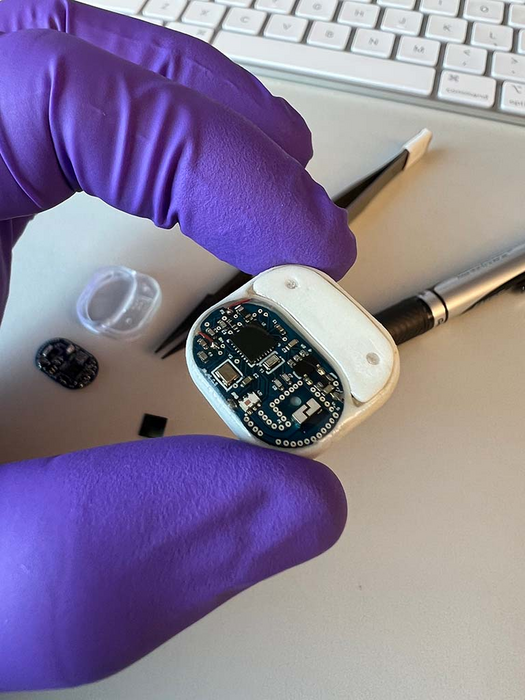KENNEDY SPACE CENTER (FL), November 21, 2022 – A new remotely controlled drug delivery implant could one day provide extended, adjustable medication for patients who need daily medicine but lack medical access—even those on spacecraft headed for Mars. Houston Methodist Research Institute researchers have developed such an implant. They are leveraging the International Space Station (ISS) National Laboratory to test the implant’s ability to be controlled in space from a device on Earth.

Credit: Houston Methodist Research Institute
KENNEDY SPACE CENTER (FL), November 21, 2022 – A new remotely controlled drug delivery implant could one day provide extended, adjustable medication for patients who need daily medicine but lack medical access—even those on spacecraft headed for Mars. Houston Methodist Research Institute researchers have developed such an implant. They are leveraging the International Space Station (ISS) National Laboratory to test the implant’s ability to be controlled in space from a device on Earth.
The investigation, launching on SpaceX’s upcoming 26th Commercial Resupply Services mission (SpaceX CRS-26), will lay the groundwork for future experiments from the research team involving rodent models on the ISS. The goal is to improve the implant’s ability to transmit signals to Earth and ensure the drug delivery system is safe for humans, said Alessandro Grattoni, professor of nanomedicine at Houston Methodist Research Institute.
“We’re preparing for the first demonstration of a remotely controlled telemedicine implant in an animal model on the ISS. It’s the ultimate sci-fi medicine in space,” Grattoni said. “And beyond our investigations, the implant could provide a valuable technology for drug dosing in rodent research studies with no need for astronaut time.”
The implant uses nanofluidics technology that combines membranes with very small nanochannels to deliver a controlled drug dose through diffusion. This investigation builds upon the research team’s previous ISS National Lab-sponsored experiments that studied fluid flow through nanochannels to design the implant’s ability to release specific amounts of drugs for individualized treatment. Grattoni also led an investigation that tested the implantable nanochannel drug delivery system in a rodent model to assess its ability to mitigate microgravity-induced muscular atrophy.
For this current investigation, Grattoni and his team will test their remotely controlled implant in an automated experiment using the Faraday Research Facility developed by ISS National Lab Commercial Service Provider ProXopS, LLC. The implant contains computer chip-like technology and is immersed in liquid saline to represent a “surrogate animal model.” The researchers will attempt to control the implant using Bluetooth and a Blackberry device on Earth to test different frequencies to determine if the implant can precisely deliver and adjust doses on command.
The investigation’s results will serve as a critical step toward the implant’s future use in space travelers who may need safe, automated access to a medication that requires frequent dosing. For example, a therapeutic currently being developed may one day help mitigate the effects of radiation or prolonged exposure to microgravity in space.
“Radiation exposure is a limitation for taking people to Mars, and even the Moon,” Grattoni said. “Other precautionary methods are being developed to prevent radiation exposure, but our device will be the first that a doctor back on Earth could use to instantly deliver medication to treat an exposed astronaut during a long-term mission.”
Grattoni’s team has also designed implants with multiple reservoirs that allow different drugs to be dosed simultaneously. The implant can even be pre-programmed, facilitating its function when communications are not possible or delayed because of distance from Earth. Eventually, Grattoni says, doctors on Earth will be able to control drug delivery implants wherever patients are located—from remote locations on Earth to distant space—using an application on their smartphone or computer.
This is one of more than 20 ISS National Lab-sponsored payloads launching on SpaceX CRS-26, which is set to launch from Kennedy Space Center no earlier than November 22 at 3:54 p.m. EST. Please visit our launch page to learn more about all ISS National Lab-sponsored research on SpaceX CRS-26.
Download high-resolution photos for this release: Houston Methodist Research Institute Investigation
View the SpaceX CRS-26 overview video: SpaceX CRS-26 Research: Overview




